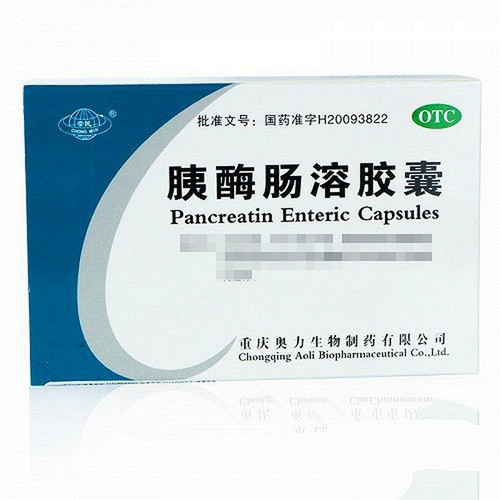Product Overview
[Drug Name]
Generic Name: Pancreatin Enteric-coated Capsules
Trade Name: Shunsheng
English Name: Pancreatin Enteric-coated Capsules
Chinese Pinyin: Yimei Changrongjiaonang
[Main Ingredients]
The main ingredient of this product is pancreatin.
[Properties]
This product is an enteric-coated capsule containing an off-white or slightly yellow powder.
[Indications]
Digestive aid. Indicated for the replacement of indigestion, digestive disorders caused by pancreatic diseases, and pancreatic exocrine insufficiency due to various causes.
[Dosage and Administration]
Oral: 0.3-1g three times daily before meals.
[Adverse Reactions]
Due to the source of pancreatic enzymes, allergic reactions to the animal protein in the preparation may occur occasionally. Long-term or high-dose exposure may cause the following adverse or toxic reactions: Inhalation of the powder may occasionally cause nasal irritation and allergic rhinitis; asthma, bronchial allergies, and pulmonary allergies have been reported after contact with the powder; gastrointestinal effects may occasionally cause diarrhea, constipation, stomach discomfort, and nausea; genitourinary effects may include reports of hyperuricemia, hyperuricosuria, and urolithiasis in children after long-term, high-dose use; and skin effects may cause allergic rashes.
[Contraindications]
Unknown
[Precautions]
1. This product is easily broken down in acidic conditions; do not chew it when taking.
2. To prevent dissolution of the enteric coating, avoid taking it with or storing it in acidic foods.
3. This product should not be used if its properties change.
[Use in Special Populations]
Precautions for Children:
There are no special contraindications for use in children, but a personalized dosing plan should be developed based on age and specific medical conditions. Please consult your physician or pharmacist for dosage.
Precautions during pregnancy and lactation:
Unclear.
Precautions for the elderly:
There are no specific contraindications for use in elderly patients.
[Drug Interactions]
Pancreatic enzymes may interact with the following medications:
1. Acarbose, miglitol: Because pancreatic enzymes are carbohydrate cleavage agents, combined use with acarbose, miglitol, and other antidiabetic drugs may accelerate the degradation of these drugs, thereby reducing their efficacy. Therefore, concomitant use should be avoided.
2. Cimetidine, ranitidine, famotidine, and nizatidine: When pancreatic enzymes are combined with these drugs, these H2 receptor antagonists can increase gastric pH, inhibiting the decomposition of pancreatic enzymes by gastric juice, potentially increasing their efficacy. Therefore, the dose of pancreatic enzymes may need to be reduced when used with these H2 receptor antagonists.
3. Folic acid: Pancreatic enzymes may interfere with folic acid absorption. Therefore, patients taking pancreatic enzymes may require folic acid supplementation.
4. Acidic medications: Pancreatic enzymes are easily degraded in acidic conditions. Do not chew when taking. Do not take with acidic medications.
5. Iron: Taking pancreatic enzymes with iron supplements may reduce iron absorption.
6. Zinc: Pancreatic enzymes may enhance zinc absorption.
[Specification]
0.15g
[Packaging]
0.15g x 24 tablets/box
[Expiry Date]
24 months
[Approval Number]
National Medicine Standard No. H20043650
[Manufacturer]
Company Name: Sichuan Shunsheng Pharmaceutical Co., Ltd.









